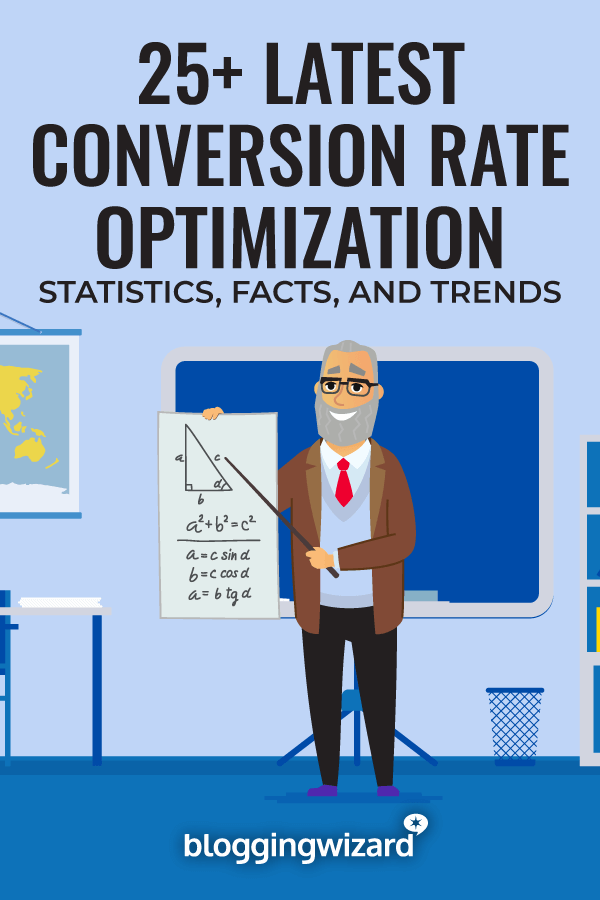25 Latest Conversion Rate Optimization Statistics For 2024
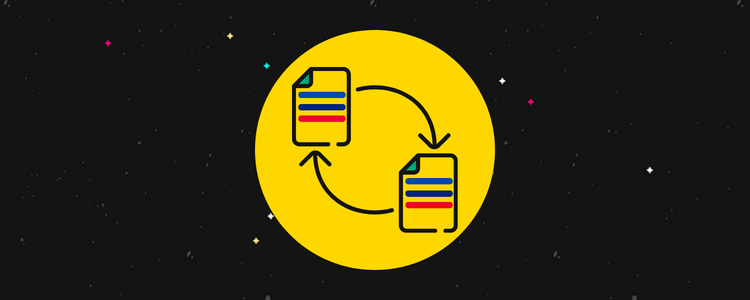
Do you work on your products and services as well as your landing page designs only to receive low conversions when you launch?
Or maybe you’re unsure of what your conversion rates should be and need a push in the right direction.
In this post, we’ve rounded up the top conversion rate optimization statistics in several categories, including general stats, landing page stats and ecommerce stats.
They’ll help you compare your conversion rate data against data from thousands of other businesses so you know how much work you need to do to catch up, or if you’re doing just fine.
They’ll also help you tweak your campaigns in several ways.
Let’s get into it.
Editor’s top picks – conversion rate optimization statistics
- Across all industries the average conversion rate is only 2.9%. (Ruler Analytics)
- The average conversion rate of a lead generation landing page is 11.9%. (Unbounce)
- Direct traffic sources convert the most with an average conversion rate of 3.3%. (Ruler Analytics)
- Ecommerce customers on tablet and desktop devices have an average conversion rate of 3.6%. (Kibo Commerce)
- A/B testing landing page designs increases conversions by 12%. (VWO)
General CRO statistics
1. The average conversion rate is 2.9%
Marketing automation company Ruler Analytics conducted a study on conversion rates by analyzing more than 100 million datapoints from its own global database.
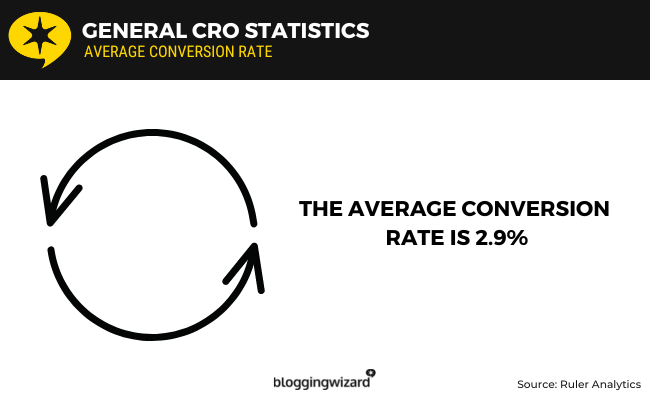
They found that the average conversion rate of all industries is only 2.9%.
Source: Ruler Analytics
2. The industry with the highest conversion rate is professional services at 4.6%
Ruler Analytics’ study found that the industry with the highest conversion rate was professional services.
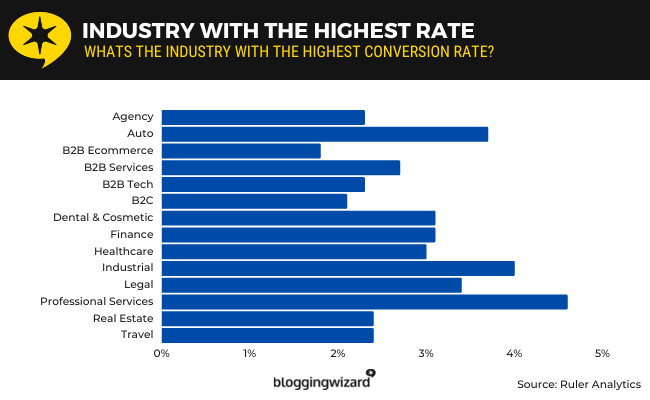
Next was the industrial industry at 4.0%, auto at 3.7%, legal at 3.4%, dental and cosmetic at 3.1%, and finance at 3.1%.
Source: Ruler Analytics
3. The industry with the lowest conversion rate is B2B ecommerce at 1.8%
Ruler Analytics’ data revealed that the industry with the lowest average website conversion rate was B2B ecommerce.
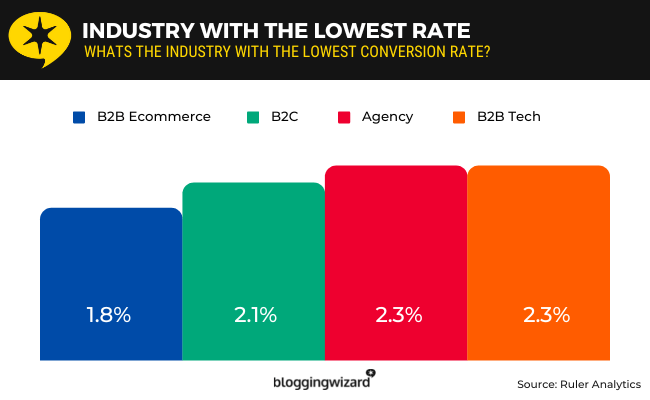
Other low-converting industries included the B2C industry at 2.1%, the agency industry at 2.3% and the B2B tech industry at 2.3%.
Source: Ruler Analytics
Conversion rate optimization statistics for marketing strategies
4. Direct traffic sources convert the most with an average conversion rate of 3.3%
Ruler Analytics’ study tested conversion rates across multiple sources: direct, email, organic search, paid search, referral and social media.
They found that direct traffic sources convert the best at an average conversion rate of 3.3%.
A “direct” visit happens when a user types your website into their address bar manually. This can be a problem since it’s difficult to track where this type of traffic comes from, unless you use a different shortlink for each direct marketing campaign.
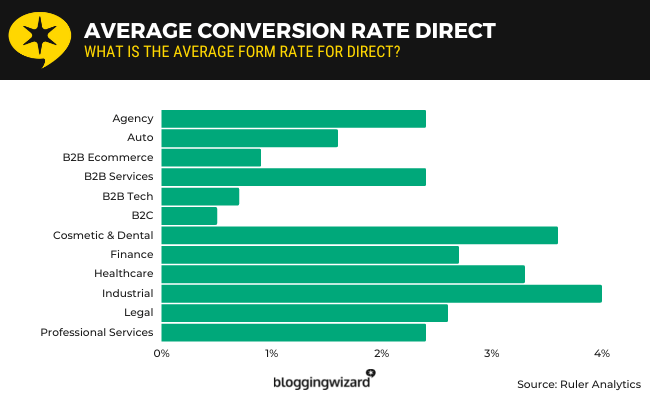
High conversion rates for this traffic source were mostly seen among the healthcare (5.3%), cosmetic and dental (5.3%), industrial (5.0%), and legal (4.2%) industries.
B2B sales had an average CR of 2.1% for the year while B2B services had 2.7%.
The study also showed that conversion rates for form-based campaigns were quite higher than call-based campaigns.
Source: Ruler Analytics
5. Paid search converts at an average rate of 3.2%
Ruler Analytics’ study on conversion rates revealed that paid search has an average conversion rate of 3.2% across all industries.
These rates were highest among the financial (5.2%), professional services (5.0%), agency (4.8%) and legal (4.3%) industries.
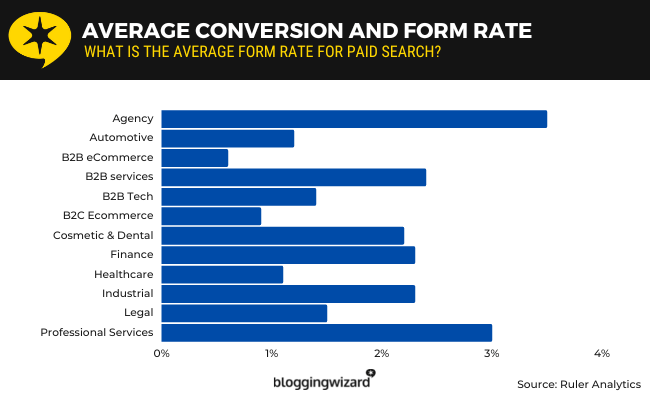
Rates were lowest among the B2B services (0.9%), B2B tech (1.5%), B2B ecommerce (1.7%), travel (1.7%) and healthcare (1.9%) industries.
Source: Ruler Analytics
6. Referrals have an average conversion rate of 2.9%
Ruler Analytics’ data reveals that referral traffic converts at an average rate of 2.9%.
Rates are highest among the cosmetic and dental (4.1%), B2B ecommerce (3.9%), financial (3.9%), healthcare (3.6%), legal (3.6%), and professional service (3.4%) industries.
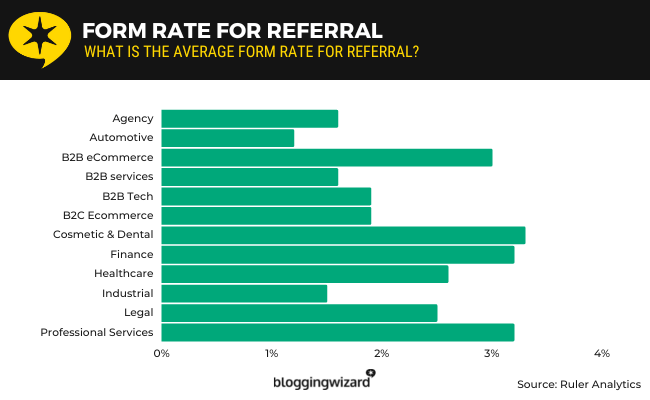
The lowest-converting industries for referrals were travel (1.0%), B2B services (1.6%), B2B services (1.9%) and B2B tech (1.9%).
Source: Ruler Analytics
7. Organic search converts at an average rate of 2.7%
Ruler Analytics’ study found that the average conversion rate for organic search was 2.7% across all industries.
This is highest among the professional services (5.0%), industrial (4.4%), automotive (4.0%) and legal (3.0%) industries.
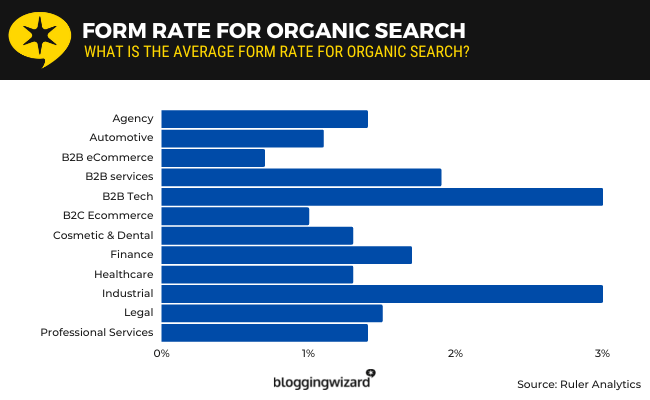
Rates were lowest among the B2C service (1.0%), B2B ecommerce (1.5%), agency (1.5%), travel (1.7%), financial (2.2%) and real estate (2.2%) industries.
Source: Ruler Analytics
8. Email campaigns have an average conversion rate of 2.6%
The 100 million datapoints Ruler Analytics analyzed in its study found that email campaigns have an average conversion rate of 2.6% across all industries.
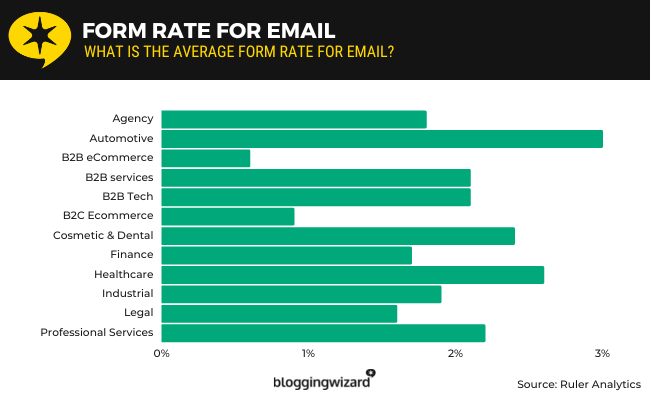
This was highest among the automotive (3.9%), real estate (3.5%), travel (3.3%), and cosmetic and dental (3.0%) industries.
Rates were lowest among the B2C service (0.9%), financial (1.9%) and agency (1.9%) industries.
The B2B ecommerce and B2B service industries had average CRs of 2.5% and 2.2% respectively for email.
Source: Ruler Analytics
9. Social media converts the worst with an average conversion rate of 1.5%
Ruler Analytics’ data found that social media converts the worst with an average conversion rate of 1.5% across all industries.
Rates were highest among the healthcare (3.0%), travel (2.7%), B2B service (2.4%) and professional service (2.3%) industries.
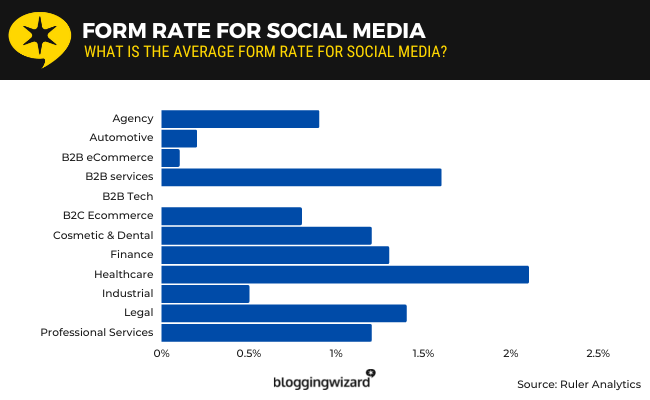
Rates were lowest among the B2C service (0.1%), B2B tech (0.3%) and B2B ecommerce (0.4%) industries.
Source: Ruler Analytics
10. A/B testing landing page designs increases conversions by 12%
When video game developer Ubisoft (Assassin’s Creed, Far Cry, Just Dance, Tom Clancy’s and more) did not see the results they wanted from the Buy Now page for their For Honor title, they worked with the services team at VWO to increase conversions for this page.
VWO is a conversion rate optimization platform, which you can use to run A/B tests for landing pages and mobile app experiences, review behavior analytics, implement personalization tactics, and more.
Ubisoft’s original page offered the game in four editions plus a season pass, and it was available for PS4, Xbox One and PC.
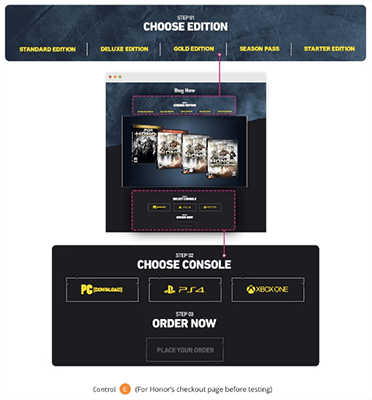
The original page’s design required customers to:
- Step 1: Choose an edition.
- Step 2: Choose a console.
- Step 3: Click a Place Your Order button.
However, because the image that displays each game edition was so large and separated Steps 1 and 2, heatmaps indicated users were not scrolling to complete Step 2.
The new landing page, designed by VWO, reduced scrolling by using a two-column design rather than just the one.
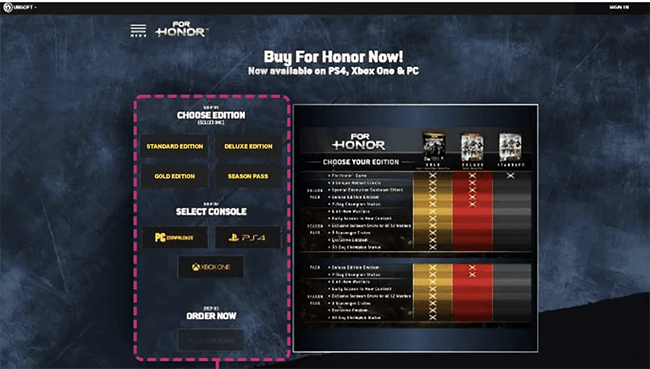
Column one had Steps 1, 2 and 3 visible in the viewport without the need to scroll, and Step 1 now had distinctive buttons instead of its original menu-like design.
They also reduced the number of editions from four to three but kept the season pass.
Column 2 had a pricing table that depicted what each edition offered.
Ubisoft ran both pages during the holiday season in an A/B test format.
They found that the control page had a median conversion rate of 38.30% while the variant saw a median conversion rate of 50.27%, an increase in conversions by 11.97%.
Source: VWO
11. User-generated content increases conversions by 8.5%
Review software company PowerReviews analyzed over 1.5MM product pages from 1,200 retailers.
They found that the simple presence of user-generated content (UGC) increases conversions on product pages by 8.5%.
UGC includes reviews, images and videos uploaded by customers, testimonials, and more.
Source: PowerReviews
Landing page conversion rate stats
12. Lead generation landing pages have an average conversion rate of 11.9%
Unbounce owns one of the most popular lead generation tools in the marketing industry. One of its core functionalities enables you to create high-converting landing pages.
The company analyzed over 44,000 landing pages created on its platform, landing pages that accrued over 260 million visits and 33 million landing page conversions.
It should be noted that Unbounce excluded pages with fewer than 500 visits and no conversions.
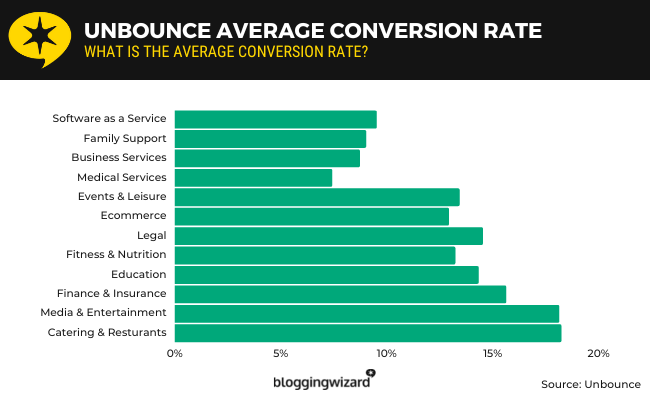
The report splits the data among 16 industries, which have a collective average conversion rate of 11.9% on landing pages.
Source: Unbounce
13. Long-form landing pages increase conversion rates by 52%
When Moz hired Conversion Rate Experts to improve their landing page design years ago, one of the first changes they made was increasing the page’s size by more than four times its previous length.
They used Moz co-founder Rand Fishkin’s five-minute sales pitch of Moz as a blueprint for the page’s content, which caused the page’s length to increase exponentially.
It also made it more engaging, which is a far more important quality to focus on than a specific length.
The result was a 52% increase in sales, which helped generate over $1 million in subscription fees for Moz.
The design is a little dated by today’s standards, but the overall layout and marketing tactics still apply.
Here are a few other changes Conversion Rate Experts made:
- Changed Moz’s original headline from “Improve your traffic and rankings with an SEOmoz PRO Membership!” to “When eBay, Disney, and Marriott need SEO help, here’s what they do…”
- Added a pricing table that depicted what subscribers would get with each subscription tier.
- Added testimonials from SEO experts.
- Included a video version of Rand’s sales pitch.
Source: Conversion Rate Experts
14. The average median conversion rate for click-based campaigns is 11.3%
Unbounce’s data reveals that landing pages designed to generate clicks convert much better than landing pages designed to capture leads.
The average median conversion rate for click-based campaigns was 11.3% while the average median conversion rate for form-based campaigns was 4.1%.
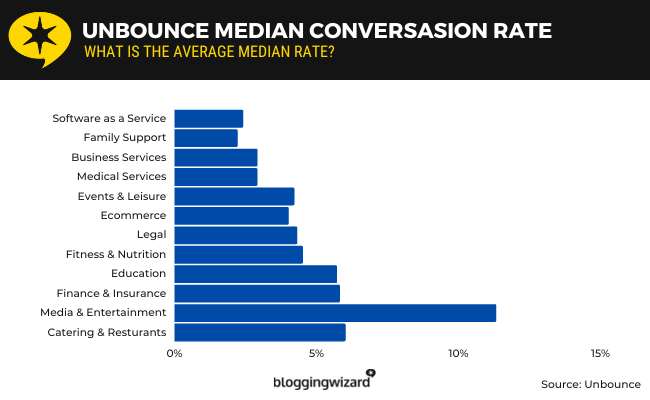
The highest median conversion rates for clicks were in the catering and restaurant (21.2%) and legal (19%) industries.
The lowest rates were in the medical service (5.9%) and real estate (5.9%) industries.
Source: Unbounce
15. The catering and restaurant industry has the highest-converting landing pages with an average CR of 18.2%
Unbounce’s data revealed that the catering and restaurant industry has the highest average conversion rate at 18.2%.
This is much higher than the average CR of 2.9% for all page types, not just landing pages made with Unbounce.
This could be an indication of Unbounce’s ability to increase conversions for marketing campaigns.
The industry’s median conversion rate was 9.8% versus the median conversion rate of 4.6% for all industries.
Conversion rates were highest for click-through conversions, which had a median conversion rate of 21%.
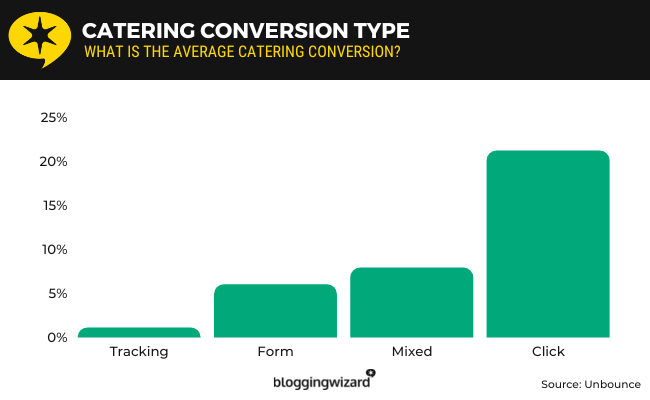
It should be noted that the catering & restaurant industry only accounts for 1% of the report’s data.
25% of the report’s data comes from the ecommerce industry, which had an average CR of 12.9% for landing pages.
13% comes from the education industry, which had an average CR of 14.2%.
Finally, 10% of the report’s data comes from the SaaS industry, which had an average CR of 9.5%.
All other industries accounted for 1-9% of the report’s data each.
Source: Unbounce
16. The home improvement industry has the lowest CR for landing pages at 7.2%
Unbounce’s report found that the industry with the lowest conversion rate for landing pages was the home improvement industry.
It had an average conversion rate of 7.2% and a median conversion rate of 3.8%. This is still much higher than the average CR for pages not created with Unbounce.
Agencies have the lowest median conversion rate at 2.4%. Their average conversion rate was 8.8%.
Click-through conversions had a median conversion rate of 9.1% for the home improvement, the highest of all conversion types.
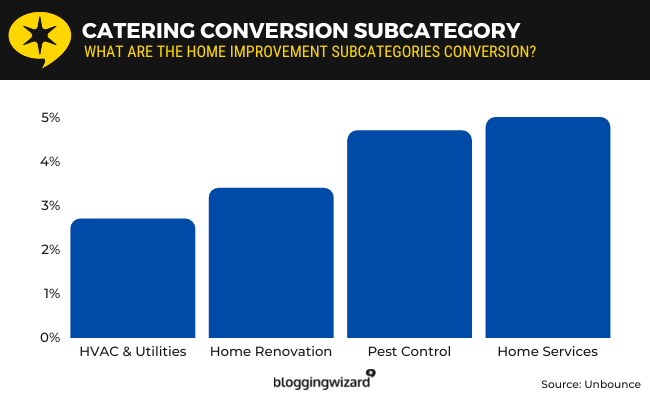
The home services and pest control subcategories have the highest median conversion rates at 5% and 4.7% respectively.
Home renovation had a median conversion rate of 3.4% while the HVAC and utilities subcategory only had 2.7%.
Plus, the home improvement industry’s median conversion rate was only 3.8%, which is lower than the median conversion rate of 4.6% for all industries.
Home improvement accounts for 6% of the report’s data while agencies only account for 1%.
Source: Unbounce
17. The SaaS industry has an average conversion rate of 9.5% for landing pages
Unbounce’s data revealed that the SaaS industry had an average conversion rate of 9.5% and a median conversion rate of 3%.
Again, SaaS companies made up 10% of the report’s data.
The apps and devices subcategory had a median conversion rate of 6.2%.
All other subcategories had median conversion rates between 1.8 and 3.4%.
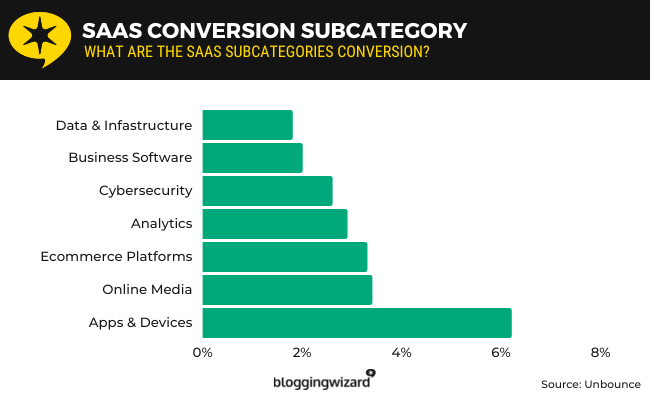
Email converts the best for SaaS landing page campaigns. It had a median conversion rate of 21%.
Social media had a median conversion rate of 5.6% while paid search was only 2%.
Source: Unbounce
Ecommerce conversion rate optimization statistics
18. The average conversion rate for ecommerce is 2.7%
Kibo Commerce is an ecommerce and order management platform.
The company analyzed billions of customer sessions across more than 250 retail brands in the United States, Great Britain, Europe, the Middle East, Africa and other territories to reveal key data about the ecommerce industry, including conversion rates.
This data revealed that the average conversion rate from retail brands around the world was 2.7% across five quarters (Q2 2021-Q2 2022).
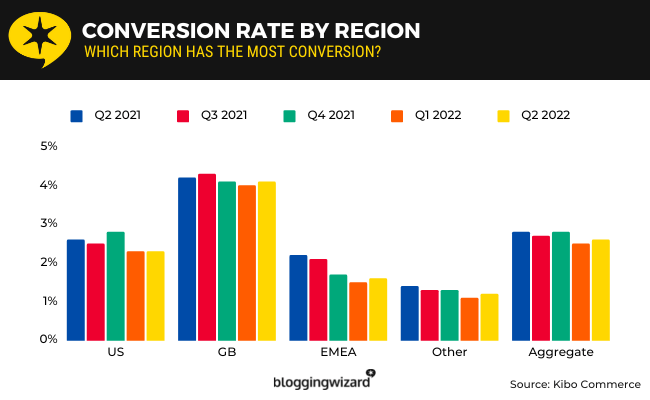
Here was each region’s average conversion rate across these five quarters:
- US – 2.5%
- GB – 4.1%
- EMEA – 1.8%
- Other – 1.3%
Source: Kibo Commerce
19. The food and beverage industry has the highest conversion rate in ecommerce with an average CR of 6.2%
The company behind leading personalization software Dynamic Yield analyzed data from their customer base, data that included 200 million monthly unique users and over 300 million sessions.
They found that the ecommerce industry with the highest conversion rate was the food and beverage industry with an average conversion rate of 6.2% over a 12-month period.
Next was the home and furniture industry at 5%, consumer goods at 4.8%, and beauty and personal care at 4%.
Source: Dynamic Yield
20. The luxury and jewelry industry has a conversion rate of 1.5%, the lowest in the ecommerce industry
Dynamic Yield’s data revealed that the ecommerce industry with the lowest conversion rate was the luxury and jewelry industry, which had an average conversion rate of 1.5% over a 12-month period.
Other low-performing industries included the multi-brand retail industry with an average CR of 2.4%, pet care and veterinary services with 3.4%, and the fashion, accessories and apparel industry with 3.6%.
Source: Dynamic Yield
21. Customers who interact with reviews are 108.3% more likely to convert
PowerReviews’ study revealed an increase in conversions by 108.3% from visitors who interacted with reviews.
You can make your reviews more interactive by letting users vote on whether or not specific reviews are helpful and by giving them filter options.
Here’s how much each interaction functionality increases conversions by:
- Helpful Yes Votes – 414.3%
- Helpful No Votes – 292.9%
- Review Search – 260.7%
- Filtering Reviews to See 1-Star Reviews – 85.7%
Source: PowerReviews
22. Users who interact with Q&A content are 194.2% more likely to convert
The data from PowerReviews’ study reveals that when customers interact with Q&A sections on product pages, conversions increase by 194.2%.
Here’s a breakdown of this statistic:
- Show More Answers – 217.9% increase in conversions
- Click Read Answers – 192.9%
- Answer Helpful Voting – 192.9%
Source: PowerReviews
23. User-generated images on product pages increase conversions by 106.3%
PowerReviews’ study revealed that users who interact with product pages are 106.3% more likely to convert.
They also found that interactions with image galleries increased conversions by 110.7%.
Source: PowerReviews
24. Ecommerce customers on tablet and desktop devices have an average conversion rate of 3.6%
Kibo Commerce’s data revealed that customers on tablet and desktop devices convert better than customers on mobile.
While customers who shop on tablet and desktop devices have an average conversion rate of 3.6%, which is higher than the ecommerce industry’s average as a whole, customers who shop on mobile devices only have an average conversion rate of 2%.
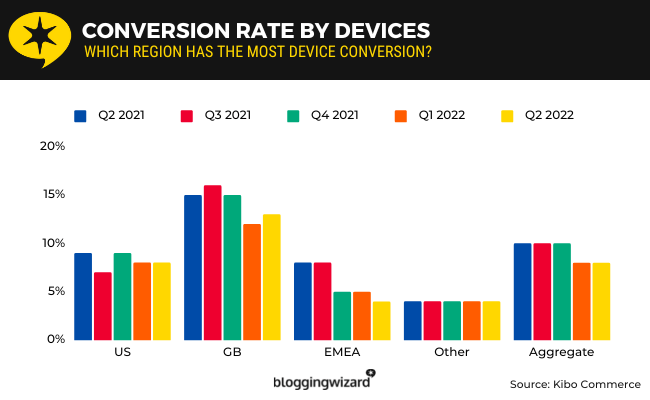
Here are the study’s results broken down by region:
- US
- Tablet – 3%
- Desktop – 3.4%
- Mobile – 2%
- GB
- Tablet – 4.6%
- Desktop – 6%
- Mobile – 3.4%
- EMEA
- Tablet – 2.2%
- Desktop – 2.4%
- Mobile – 1.4%
- Other
- Tablet – 1%
- Desktop – 2%
- Mobile – 1%
You can see that when we break the data down by region, desktop outperforms tablet and mobile devices as far as conversion rate goes.
Source: Kibo Commerce
25. Search traffic converts the highest in ecommerce with an average conversion rate of 3%
When we remove the “Unknown” traffic source from Kibo Commerce’s data, which has an average conversion rate of 4% across five quarters, we can see that search traffic has the highest conversion rate in the ecommerce industry.
It brought in an average conversion rate of 3% across five quarters.
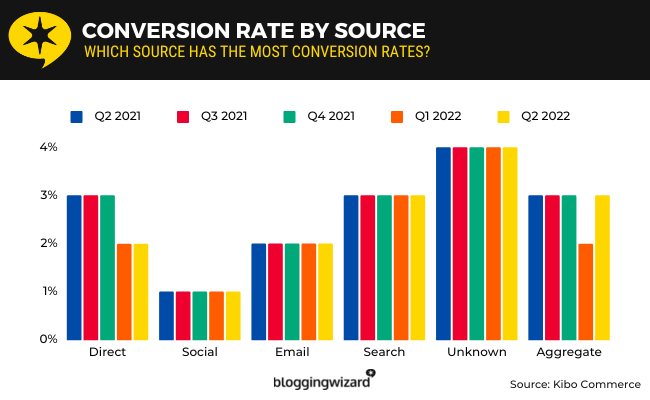
Direct traffic brought in 2.6% while email and social media traffic brought in 2% and 1% respectively.
Source: Kibo Commerce
Conversion rate optimization sources
Final thoughts
That concludes our list of the top conversion rate optimization statistics. Let’s review a few things from this list.
One of the more important takeaways is how all conversion rates are not made equal.
Your industry, the type of page you use in your campaign and the way you refer traffic to that page are all key factors that determine what your conversion rate will likely be, even before you create a design.
Use the stats in this post to determine what traffic sources convert best for your industry, and work on improving them. You can always focus on other traffic sources later.
When you design your landing page, don’t shy away from longer designs.
So long as your content is engaging throughout the page and your design complements that engaging content, you’ll do just fine, especially if you include copy and designs that accurately explain what customers will get as well as use attention-grabbing headlines that generate curiosity.
Lastly, if you’re in the ecommerce industry, pay special attention to the mobile version of your website, and consider creating a dedicated mobile app.
The statistics in this post prove that ecommerce businesses are not doing enough to make mobile designs intuitive and engaging.
All in all, you can really outperform competitors in your industry with just a few simple tweaks. You might also consider using conversion rate optimization software.
For additional reading on conversion rate optimization:

